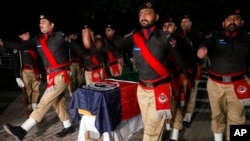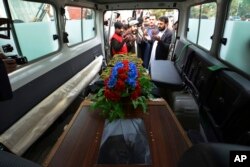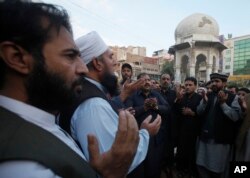Afghan authorities Thursday returned the body of a Pakistani policeman who disappeared in Islamabad about three weeks ago and was found dead in an Afghan border region, an unsolved killing that has worsened tensions between the uneasy neighbors.
Pakistani authorities stopped short of blaming Afghanistan for orchestrating the abduction and slaying of senior police officer Tahir Dawar, who was based in Peshawar but had traveled to the Pakistani capital to visit his family.
Prime Minister Imran Khan has ordered an inquiry into the death.
Suspected groups
Authorities in Islamabad suspect that the Pakistani Taliban, which allegedly operates out of Afghan bases, was behind Dawar's kidnapping. But the militant group denied its involvement in a statement sent to reporters this week.
Pakistani Deputy Interior Minister Shaharyar Afridi told lawmakers on Thursday that the slain officer, an ethnic Pashtun, was actively involved in anti-militancy operations and twice escaped suicide bombings aimed at assassinating him.
He said investigators already had determined the route kidnappers used to transport Dawar to Afghanistan, and he vowed to pursue the killers.
On Wednesday, the Afghan Foreign Ministry officially informed its Pakistani counterpart that villagers had found the officer's body and police service card in a border area of the volatile Afghan province of Nangarhar.
Afghan authorities have said little about who could have been responsible for his death, and mainly discussed with their Pakistani counterparts the logistics of the handover of the body. Dawar's remains were returned to Pakistan on Thursday at the Torkham border crossing.
Risk of inflaming tensions
Dawar's death carries a risk of inflaming tensions in Pakistan, where Pashtun rights activists have held rallies condemning alleged extrajudicial killings of Pashtuns, accusing state agencies of abuses in the name of fighting a war against militancy and terrorism.
Jamila Gilani, an organizer with the Pashtoon Tahaffuz Movement, said the group would launch protests in several cities over Dawar's death, accusing the Pakistani government of failing to protect its citizens.
Pakistani Foreign Ministry spokesman Mohammad Faisal said authorities had summoned the deputy Afghan ambassador and strongly protested "the inordinate delay and manner of return of the body."
Faisal did not explain further, nor has the Afghan side offered any reaction to the Pakistani assertions.
"It is hoped that Afghan authorities will offer full cooperation in ascertaining the circumstances under which a Pakistani police officer was found killed in Afghanistan," the spokesman said.
Pakistan army spokesman, Maj. Gen. Asif Ghafoor, condemned Dawar's killing.
Ghafoor said the officer's abduction, his killing on Afghan territory and "follow-up behavior" of authorities of the neighboring country "raise questions which indicate involvement or resources more than a terrorist organization in Afghanistan."
Pakistani officials frequently blame the National Directorate of Security for supporting fugitive anti-Pakistan militants. For its part, Kabul accuses the Pakistani spy agency, ISI, of sheltering members of the Afghan Taliban insurgency.
Pakistan and Afghanistan share a 2,600-kilometer, largely porous border, and each often accuses the other of sheltering militants conducting terrorist attacks.
Umer Farooq contributed to this report.






